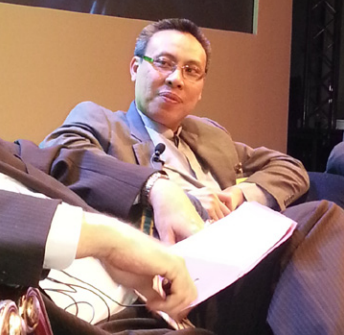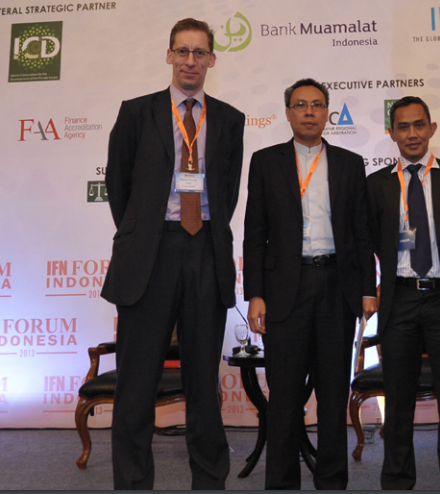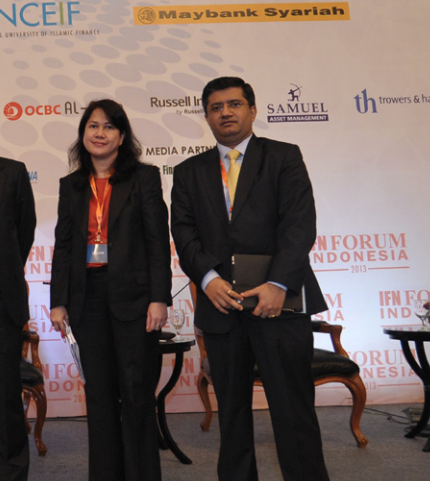
What is your educational and professional background?
I have twenty years of experience in business management, 12 of which have been in education and training, holding senior management positions in universities as well as being a consultant. My expertise has developed over the past decade and become invaluable as part of, and whilst leading, teams focussed on design and development of commercially driven, high-quality professional training programmes for all levels.
I am passionate and committed to quality assurance and accreditation of human capital learning initiatives on national and international levels. Prior to assuming my current position, I was the Chief Accreditation Officer and Senior Director at Asian Institute of Finance where I was responsible for the development of the Learning Programme Assessment and Accreditation Framework and Learning Programme Criteria for the financial services industry. I am also sitting on an expert panel for finance and accounting standards under the Malaysian Qualifications Agency (MQA), an agency of the Malaysian Higher Education Ministry. I am a certified trainer and HR professional, having undergone the Certified Training Professional programme under the Chartered Institute of Personnel and Development (CIPD), UK and the Institute of Personnel Management respectively.
Tell us more about FAA, its aims and objectives.
Finance Accreditation Agency (FAA) is an international and independent quality assurance and accreditation body supported by Bank Negara Malaysia (BNM) and Securities Commission Malaysia (SC). FAA is responsible for quality assurance and quality promotion of learning initiatives within the financial services industry (FSI), including learning programmes, institutional and individual accreditation, recognition of prior learning and promotion of future learning practices in the FSI. Through these initiatives, FAA aims to contribute towards promoting the highest standards in the development of talent for the FSI.

Why do you think there is a need for an institution like FAA, and what type of institutions would require your services?
The establishment of FAA complements the Financial Sector Blueprint 2011-2020 of BNM and the SC Capital Market Master Plan 2 with a clear emphasis in enhancing the competencies of the existing workforce in the FSI. FAA ascertains that quality is met in the design, development and delivery of learning programmes through accreditation based on our Accreditation Framework and the corresponding Learning Programme Criteria. The Accreditation Framework is developed based on international good practices, that is, after extensive research and study of adult learning and higher education models adopted by different countries such as Australia, Hong Kong SAR, Singapore, United Kingdom and a number of institutions such as the Asia Pacific Quality Network (APQN) in which FAA is a member and the International Network for Quality Assurance Agencies in Higher Education (INQAAHE).

All training providers involved in offering learning programmes, ranging from one-off to certification programmes to the FSI employees, are covered in the scope of accreditation by FAA.
How closely do you work with Bank Negara and the Securities Commission? Is there an interactive relationship between FAA and these organisations, or is FAA independent of their influence?
FAA is established with the support of BNM and SC in carrying out its mandates. There are frequent communications between FAA, BNM and SC in terms of understanding their concerns for the human capital development in the FSI. However, FAA remains independent in its accreditation processes and decisions.
Why do you think institutions like to be accredited?
A training provider with accredited learning programmes assures the best practices of a quality learning programme, including a proper structure in design, development and delivery. The input provided by the accreditation panel members, who are subject matter experts and industry practitioners, allows the training providers to determine the competencies and learning needs of the FSI. An accredited learning programme also enhances the marketability and elevates the standing of the training providers making them both locally and globally recognised. FAA has the mandate to seek international recognition for its accredited learning programmes and this is one important component of the Finance Qualification Structure (FQS) which FAA is currently developing. The FQS will map all the qualifications and level them accordingly based on the learning outcomes derived from the Learning Programme Content Standards (LPCS) which has also been developed by FAA.

What Accreditation programmes do you offer? What do these programmes consist of?
At present, FAA is accrediting learning programmes offered by registered training providers to FSI employees based on a well-established framework and criteria. The learning programmes cover various sectors such as Islamic Finance, Insurance and Takaful, Conventional Banking, Capital Markets and Corporate Programmes. FAA is currently developing the criteria for institutional and individual accreditation.
What services do you offer Islamic financial institutions?
FAA supports human talent development in Islamic financial institutions by accrediting learning programmes in the relevant areas offered by training providers, locally and internationally, such as the Islamic Banking and Finance Institute Malaysia (IBFIM). FAA has also been working closely with the Association of Sariah Advisors in Islamic Finance (ASAS) and the Association of Chartered Islamic Finance Professionals (ACIFP) in ensuring that the standards for Shari’a advisors and professional memberships in Islamic finance are of high quality.
Human resource development has been flagged as a crucial challenge to overcome in order to develop the Islamic finance industry? What are the problems in developing human resources in Islamic finance, and what more needs to be done?
There are a number of challenges facing human resource development in Islamic finance. These include the lack of interaction between academia and industry to develop a holistic curriculum in Islamic finance which has resulted in a mismatch between the graduates produced and industry requirements; the absence of global standards governing professional education and training, and scarcity of talent in Islamic finance leading to less creative and innovative products and services offered to the market.
FAA intends to bridge these gaps through the development of Learning Programme Content Standards for the various sectors under Islamic finance to ensure that all the accredited learning programmes are relevant to industry requirements. The Finance Qualification Structure (FQS) which incorporates the mapping of different qualifications in Islamic finance as well as a structure for recognition of prior learning so that talented individuals can practice across jurisdictions through the use of one global set of standards.
You are part of the finance and accounting standards committee within the Malaysian Qualifications Agency (MQA). Explain to us the purpose of MQA, your role, and its relationship to Islamic finance?
My role in the committee is to provide input from the standpoint of the industry, which is very much related to the purpose of the existence of FAA. MQA is the de facto accrediting body for all academic programmes in Malaysia. MQA consults academic and industry experts in formulating standards for academic programmes, which include the discipline of finance and accounting to ensure that graduates are exposed to both theoretical and practical aspects of the respective programme that they enrolled and successfully completed. FAA works closely with MQA as both share the same objectives for producing quality assuring learning programmes. As a matter of fact, the Chief Executive Officer of MQA sits on the Board of Directors of FAA.
MQA has developed programme standards for muamalat and Islamic finance for related academic programmes. There are also separate programme standards for law and Shari’a. FAA will complement the standards by providing input from the industry through our Learning Programme Criteria and industry-led principles, thus enriching the learning process of students.
Do you perceive Islamic accreditation standards to be significantly different to international accreditation standards? In your opinion, do Islamic accreditation standards need to develop more? If so, what institutions are doing positive work in this field?
There is no similar setup that deals comprehensively with accreditation standards for industry-based learning programmes in Islamic finance, although it is acknowledged that MQA has developed one for related academic programmes. However, the standards do not, and should not, differ across economies and jurisdictions as they are derived from Shari’a. What differs is the interpretations of Shari’a and therefore practices. At FAA, we exercise flexibility in this regards as we respect the unique and specific regulations of different countries. To us, a learning programme is accredited as long as the training provider shows evidence that the learning programmes lead to the development of competencies needed in the respective marketplace.
Is FAA targeting only Malaysia or is the aim to reach out to financial institutions globally? If so, how do you aim to achieve it?
FAA must be able to capture the global players as well to make practices of quality learning sustainable. The first key thing that FAA needs to do is to collaborate with local, regional and international professional bodies to promote the highest standards of professional learning in the FSI.
Would you be collaborating with international Islamic financial organisations (like Islamic Research and Training Institute (IRTI)) to spread your programmes for the Islamic financial industry?
Yes. As highlighted, FAA is keen to form partnerships with renowned institutions such as IRTI to bring together our respective strengths in different fields, and backgrounds, in enhancing the learning of Islamic finance programmes globally. One of our strategic initiatives is to provide collaborations and affiliations for mutual and global recognition in quality learning.
What challenges do you face in achieving your goals? Does the Islamic financial industry offer new challenges?
Diversity of regulatory framework and operations across borders requires careful study and review before a common understanding can be achieved for best practices. Particularly in the Islamic financial industry, Malaysia already has the advantage of having the best-regulated structure that has become the reference for the rest of the world.
You have recently visited UK and visited a number of institutions; can you please share what your achievements were?
FAA had a successful visit to few established institutions during our recent visit to London which was in conjunction with the 12th Annual Islamic Finance Summit 2013. The visit to the Chartered Institute of Securities and Investment (CISI) for example has led to the recognition of FAA as an accreditation body, as CISI will be submitting their training programmes to our agency for accreditation purposes. More institutions will also be expected to do the same in due course as a result of our meeting engagements in UK recently.
Compare your role at FAA with AIF as Head of Accreditation. How did the roles differ?
In AIF, accreditation, although core, was only one of the functional areas. FAA is solely focussed on quality assurance & accreditation for Affiliated Institutes such as Institut Bank-Bank Malaysia (IBBM), Islamic Banking & Finance Institute Malaysia (IBFIM), Malaysian Insurance Institute (MII), and Securities Industry Development Corporation (SIDC). At FAA however, I am able to widen the scope of the accreditation exercise to broader sectors and to different geographies.
Tell us about a typical working day of Dr Amat Taap Manshor.
As a CEO in a dynamic environment, I am always at the mercy of my diary, the businesses and the stakeholders. I help design the strategic direction of the agency with my team, work on business development with existing clients, establish new partners, and keep the team spirit alive and focused on their work on any given day, and still get in a minimum amount of time for exercise, family and personal tasks.
Your work in training and education has meant working with people of different attitudes and capacities? As an educator, what do you believe is the greatest challenge in educating and inspiring trainees?
Educators and trainers face significant challenges when it comes to educating or training working adults. Understanding their competencies, capacities and needs are critical for trainers to develop effective and relevant programmes. Scheduling training is also a difficult challenge for a trainer. Many managers are reluctant to let employees take time away from their duties for training. In this instance, scheduling short training sessions rather than all-day or long-timing sessions is a better option. Industrially, apart from the commitment to deliver quality training, the rapid changes in technology, corporate initiatives and programmes make learning more challenging as in an increasingly complex and value-driven world, change is constant and often contentious. This could be viewed positively by using learning methods such as social media and eLearning. Trainers need to address these challenges to provide innovative and practical training in making the learning process more interesting, effective and relevant.
What is your opinion of the Islamic finance industry in Malaysia?
The Malaysian Islamic finance industry has enjoyed remarkable growth over the last 30 years due to the strong support provided by the Government. Malaysia is now recognised as one of the largest Islamic finance hubs in the world. As a matter of fact, Malaysia is acknowledged as one of the few countries that have an Islamic finance system running alongside the conventional system. I strongly believe that the Islamic finance industry in Malaysia will continue to flourish with leading-edge products and services, provided that there is a strong pool of human capital with appropriate competencies that could lead us forward. FAA is proud to be part of this dynamic environment and I trust that FAA’s strategic roles will contribute further to the competitiveness of Malaysia’s financial landscape.



